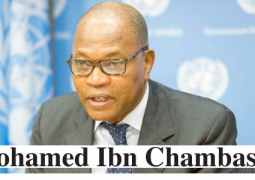Stakeholders within the Ministry of Fisheries and Water Resources yesterday partook in a day-long session, aimed at establishing a national inter-ministerial committee for the Canary Current Large Marine Ecosystem (CCLME) Ecosystem approach to fisheries.
Held at the conference hall of the Ministry of Fisheries in Banjul, the meeting brought together stakeholders from various sectors, funded by the FAO and GEF.
In his official opening statement, Famara Dampha, who is the Director of Fisheries at the ministry, said the fishery sector will continue to occupy centre stage on The Gambia government’s agenda, due to the indisputable contribution the sector plays in promoting the health of Gambians through good nutrition, as well as addressing poverty and employment in the population.
“The Government of The Gambia is extremely concerned about the threats of unsustainable resource use and the threats of human made damages to the aquatic environment,” he said, adding that the government is addressing these threats through various measures.
“Firstly, it has created policy and legal frameworks in support of sustainable fisheries and the conservation of marine resources and the environment,” Dampha stated, noting that in this context, the government is implementing relevant provision of the FAO’s Code of Conduct for Responsible Fisheries.
According to him, during the preparatory phase of the CCLME project, the participating countries and several development partners undertook a series of national consultative and regional meetings leading to a preliminary Transboundary Diagnostic Analysis- TDA.
This preliminary TDA, he stated, has identified and analyzed specific priority transboundary concerns and actions so as to address them, hence the project was designed on the outcomes of this analysis.
Noting that the project consists of three main components (process, marine living resources and biodiversity, habitat, and water quality), Dampha said, the Government of The Gambia has deemed it fitting and necessary.
Priority, he added, will be accorded to directing efforts at encompassing fisheries research and management activities into the evolving state-wide natural resource management framework.
“In order to optimise the social and economic returns of the fisheries resources, accelerated efforts will be needed to facilitate increased participation of nationals (especially youths) in the fisheries sector for employment opportunities and effective participation in the management of the resources for future generations,” he stated.


